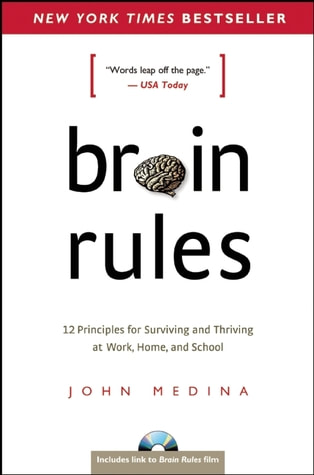| |||

Brain Rules, by John Medina: A Book Review
Dr. Mark Rosekind, NASA scientist, discovered a single activity with a startlingly large impact on pilot performance.
“What other management strategy will improve people’s performance 34% in just 26 minutes?” he famously asked.
The answer to that is just one of the pearls of wisdom from John Medina’s book, “Brain Rules”. Medina is a molecular biologist who has spent a lifetime examining human brain development. In this book, he takes us on a journey inside the brain, describing its various parts and what they do, and then he dives even deeper to observe how our neurons communicate with each other. But this isn’t a biology textbook, and since Medina knows how your brain works, he knows how to keep it engaged and excited. It's an easy and entertaining read, while still being practical.
The book outlines 12 “rules” distilled from decades of brain science. Each chapter is focussed on one “rule” about how the brain works according to research. Each chapter concludes with concrete ideas on how work, home, and school could be improved if we honoured that particular rule.
For example, the chapter about memory discusses the importance of spaced repetition (not cramming!) for learning. If you do a lot of thinking about a topic, and talk about it a lot, that information gets committed to memory because your brain keeps rehearsing and retrieving the information.
How could that idea have real-life applications? It could have implications for how work training is conducted, for one thing. Medina also suggests experimenting with organizing school subjects into cycling modules.
In the chapter on sleep, Medina notes that teenagers, on average, tend to temporarily shift to a night owl chronotype. Would most teens benefit if high school classes started after 9:00 am? How about if we matched student-teacher chronotypes?
Taken together, the ideas Medina suggests at the end of each chapter could change society as a whole… but more practically speaking, they can help you make more interesting presentations, boost your productivity, sharpen your memory, and improve learning.
So what is that single activity that Rosekind found will boost your performance and improve your memory? It’s an afternoon nap.
Brain Rules is published by Pear Press. Find out more at www.brainrules.net.
This review was written by Fawn Fritzen.
Dr. Mark Rosekind, NASA scientist, discovered a single activity with a startlingly large impact on pilot performance.
“What other management strategy will improve people’s performance 34% in just 26 minutes?” he famously asked.
The answer to that is just one of the pearls of wisdom from John Medina’s book, “Brain Rules”. Medina is a molecular biologist who has spent a lifetime examining human brain development. In this book, he takes us on a journey inside the brain, describing its various parts and what they do, and then he dives even deeper to observe how our neurons communicate with each other. But this isn’t a biology textbook, and since Medina knows how your brain works, he knows how to keep it engaged and excited. It's an easy and entertaining read, while still being practical.
The book outlines 12 “rules” distilled from decades of brain science. Each chapter is focussed on one “rule” about how the brain works according to research. Each chapter concludes with concrete ideas on how work, home, and school could be improved if we honoured that particular rule.
For example, the chapter about memory discusses the importance of spaced repetition (not cramming!) for learning. If you do a lot of thinking about a topic, and talk about it a lot, that information gets committed to memory because your brain keeps rehearsing and retrieving the information.
How could that idea have real-life applications? It could have implications for how work training is conducted, for one thing. Medina also suggests experimenting with organizing school subjects into cycling modules.
In the chapter on sleep, Medina notes that teenagers, on average, tend to temporarily shift to a night owl chronotype. Would most teens benefit if high school classes started after 9:00 am? How about if we matched student-teacher chronotypes?
Taken together, the ideas Medina suggests at the end of each chapter could change society as a whole… but more practically speaking, they can help you make more interesting presentations, boost your productivity, sharpen your memory, and improve learning.
So what is that single activity that Rosekind found will boost your performance and improve your memory? It’s an afternoon nap.
Brain Rules is published by Pear Press. Find out more at www.brainrules.net.
This review was written by Fawn Fritzen.
Audio read and recorded by Fawn Fritzen.

